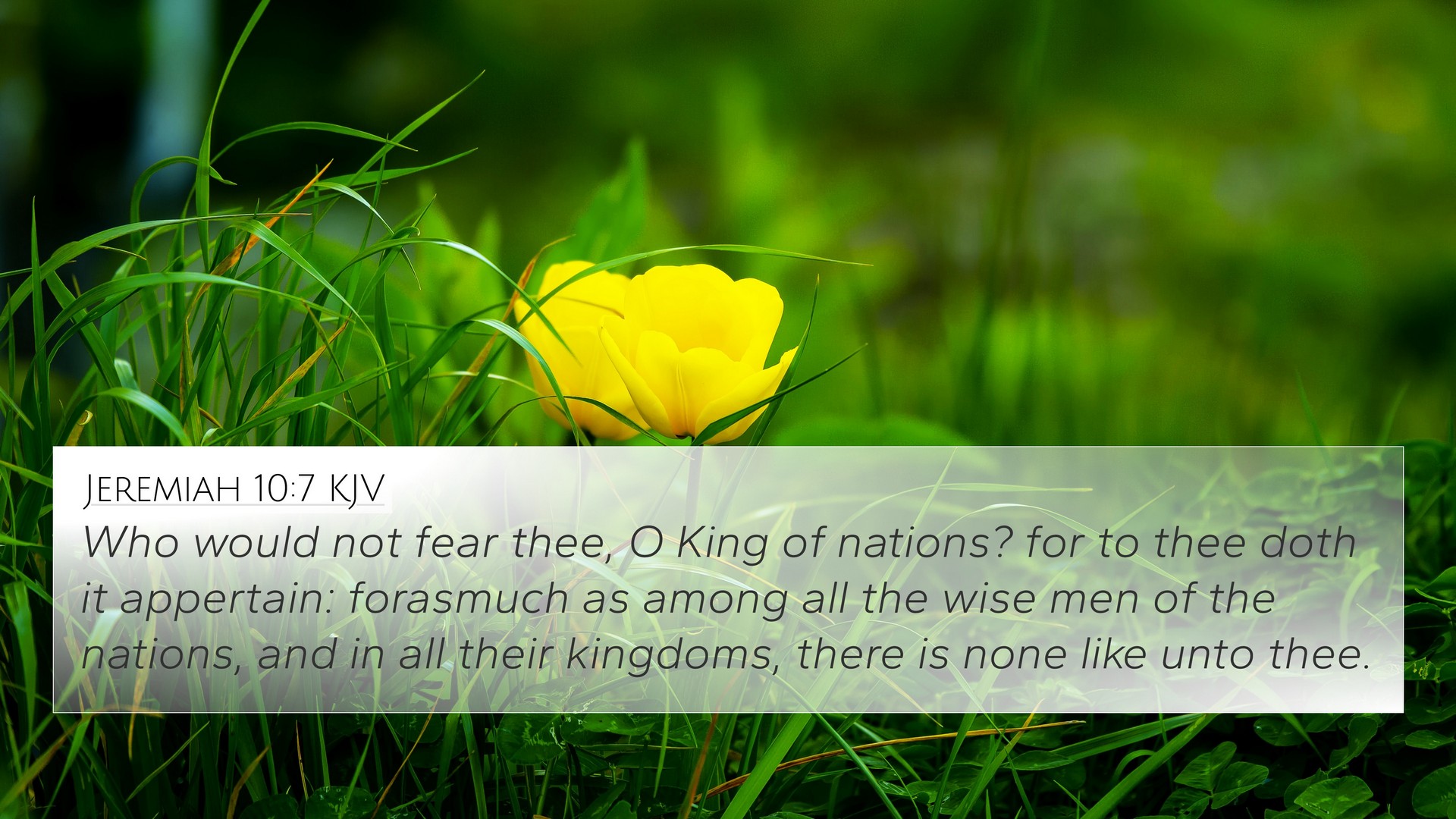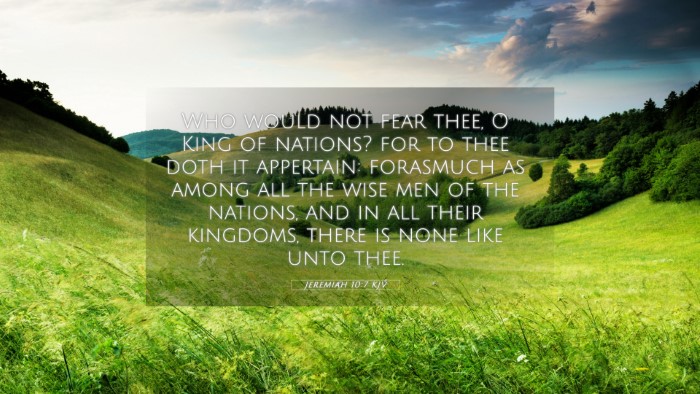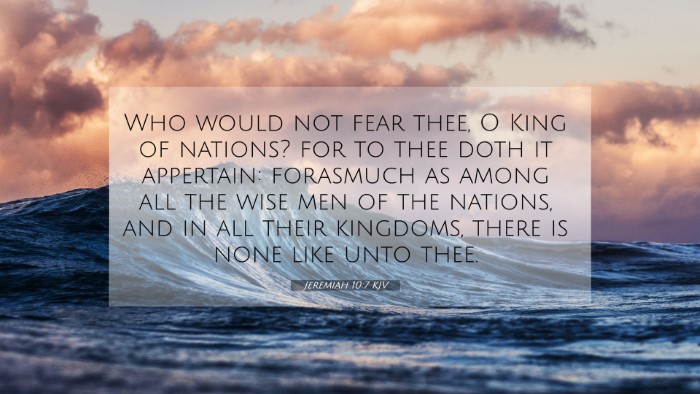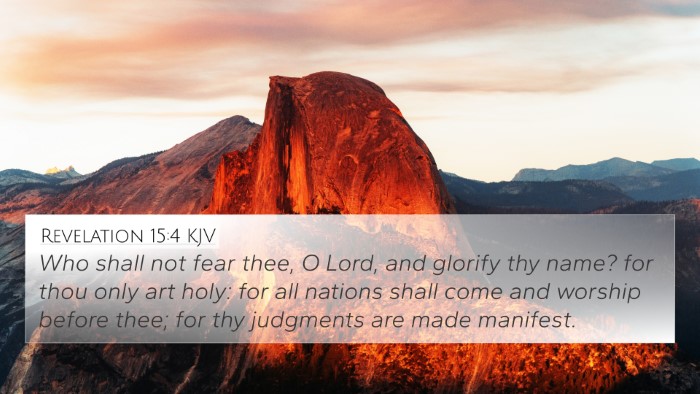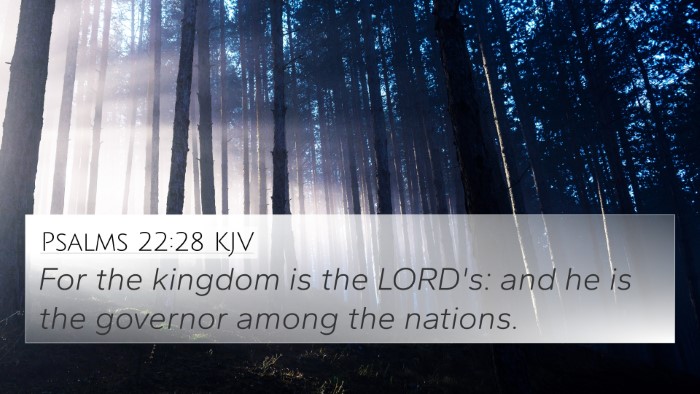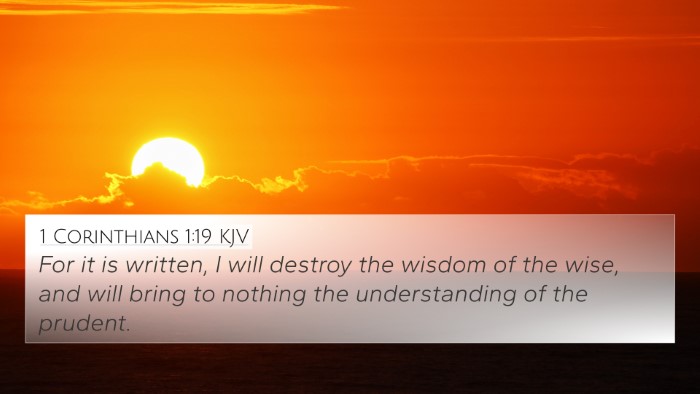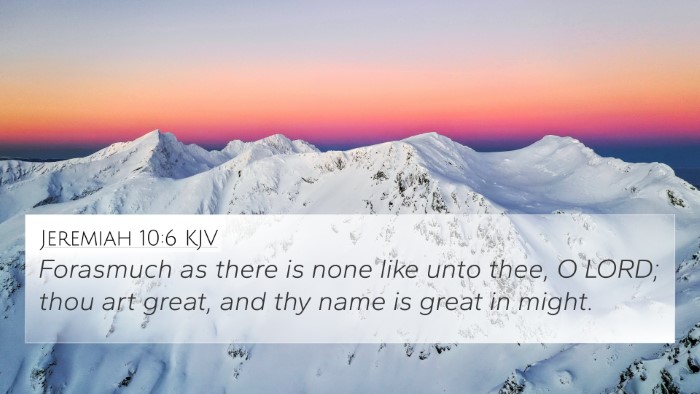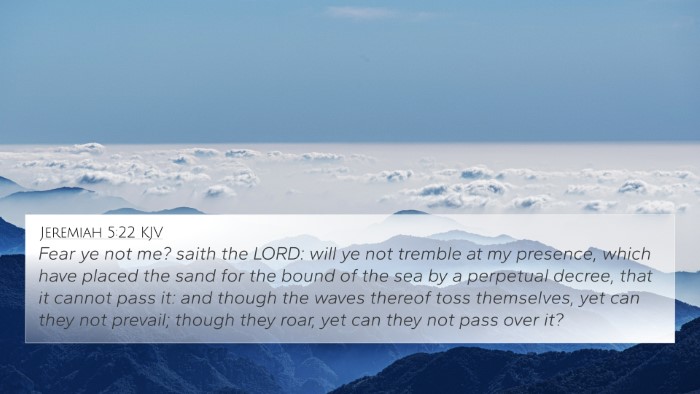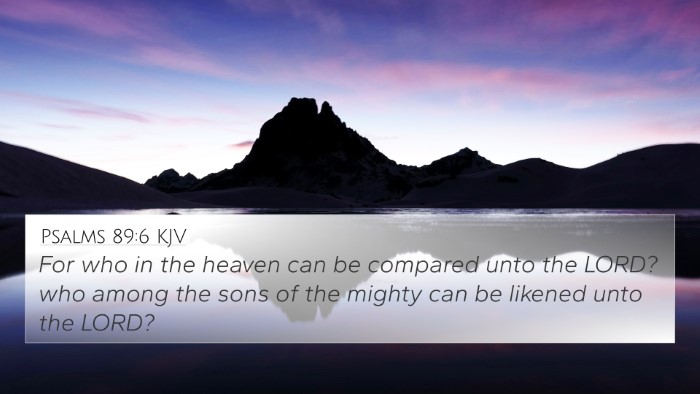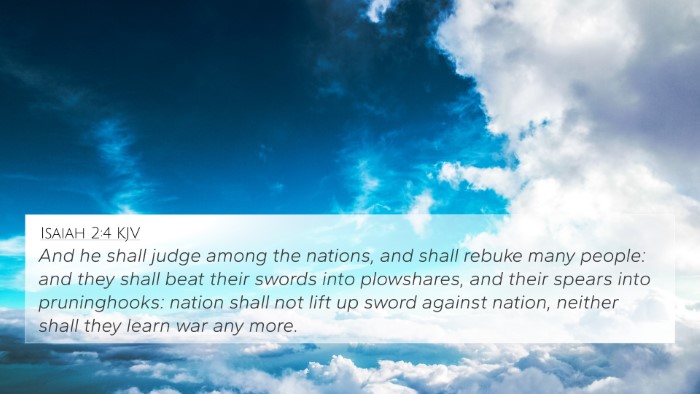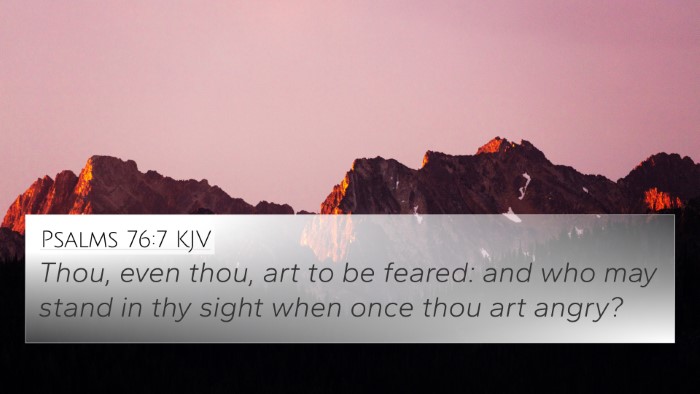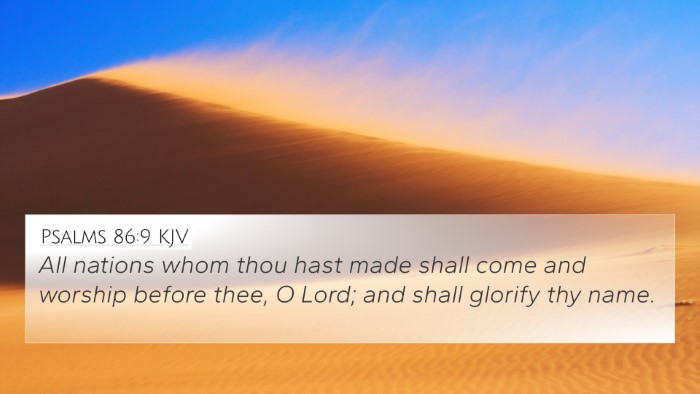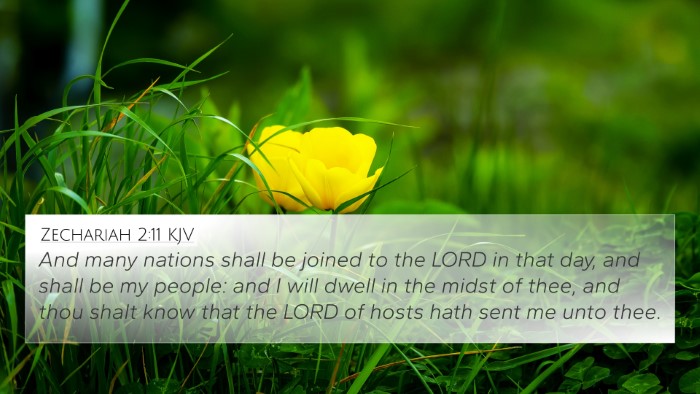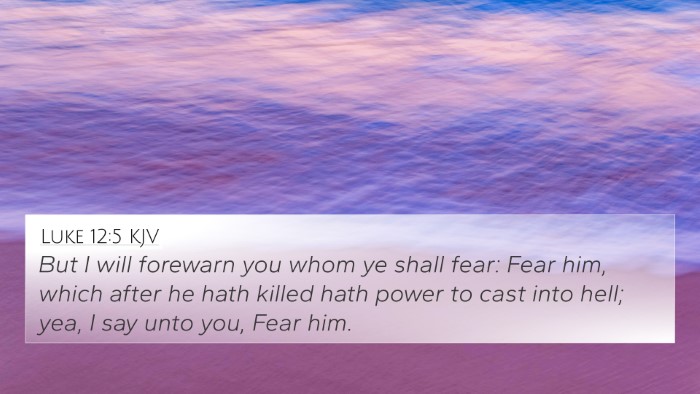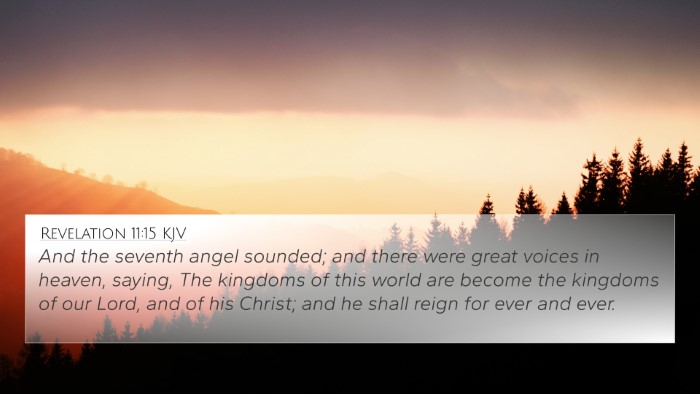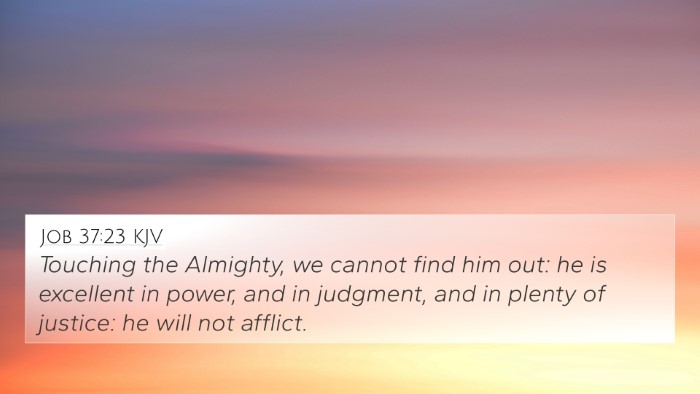Understanding Jeremiah 10:7
Verse: "Who would not fear you, O King of the nations? This is your due; for among all the wise ones of the nations and in all their kingdoms, there is no one like you."
Overview of Jeremiah 10:7
This verse expresses the idea of God's unique sovereignty and wisdom, distinguishing Him from the false gods and idols of the nations. It is a call to recognize God’s rightful place as the King of all nations.
Commentary Insights
Matthew Henry's Commentary
Matthew Henry highlights the significance of fearing the Lord, which is attributed as a due tribute that mankind owes to God. He emphasizes that God’s position as the King of nations is unparalleled; no one else possesses the wisdom or power that He does. This fear is not seen as mere terror but rather as reverence and awe for His majesty and authority.
Albert Barnes' Notes
Albert Barnes notes that this verse serves as both a declaration and an exhortation. The challenge lies in the acknowledgment of God’s supremacy among all nations and acknowledges that worldly wisdom pales in comparison to divine wisdom. Barnes further argues that the verse serves as a reminder that the recognition of God is essential for any nation’s prosperity and that ignorance of God leads to folly.
Adam Clarke's Commentary
Adam Clarke elaborates on the verse by pointing out the futility of idol worship prevalent during the time of Jeremiah. He states that the fear of God should naturally outweigh the fear of man-made idols. Clarke emphasizes that the rhetorical question posed suggests the absurdity of not fearing the true and living God when He is matchless among all the wise ones and rulers of the earth.
Connections Between Bible Verses
Jeremiah 10:7 has many connections with other scriptures that highlight themes of God's sovereignty, wisdom, and the futility of idolatry. Below are some relevant cross-references:
- Psalm 96:4-5: "For great is the Lord, and greatly to be praised; he is to be feared above all gods. For all the gods of the peoples are worthless idols, but the Lord made the heavens." This passage reinforces the unique position of God among false idols.
- Isaiah 40:18: "To whom then will you liken God, or what likeness compare with him?" This verse reflects the incomparable nature of God.
- 1 Corinthians 8:4-6: "Therefore, as to the eating of food offered to idols, we know that 'an idol has no real existence,' and that there is no God but one." This New Testament reference connects to the theme of the futility of idol worship.
- Romans 1:20-23: "...for his invisible attributes, namely, his eternal power and divine nature, have been clearly perceived, ever since the creation of the world..." This emphasizes the obligation of nations to recognize God’s authority.
- Acts 17:24-25: "The God who made the world and everything in it, being Lord of heaven and earth..." This reaffirms God's sovereignty over all creation.
- Colossians 1:16: "For by him all things were created..." This underscores the notion that God is supreme over all creation.
- Revelation 15:4: "Who will not fear, O Lord, and glorify your name? For you alone are holy. All nations will come and worship you..." This verse anticipates the ultimate acknowledgment of God's sovereignty by all nations.
Thematic Connections
When examining the thematic connections among Bible verses, Jeremiah 10:7 serves as a pivotal verse revealing themes of idolatry, acknowledgment of God's greatness, and divine sovereignty. The chapter resonates with the broader messages found throughout the scriptures:
- Idolatry and False Worship: The rejection of God as King leads to the worship of idols, which is a recurring message throughout the Bible.
- Fear and Reverence for God: The appropriate response to knowing God’s supremacy is a reverent fear that leads to worship and obedience.
- Sovereignty of God: The acknowledgment of God’s rule over nations and history highlights His unchallenged authority in creation.
Tools for Bible Cross-Referencing
To delve deeper into the meanings of Jeremiah 10:7 and similar passages, consider using the following resources:
- Bible Concordance: Essential for finding related verses based on key words.
- Bible Cross-Reference Guide: A useful tool for linking related scriptures across different books.
- Cross-Reference Bible Study: Techniques for connecting verses for deeper understanding.
- Bible Reference Resources: Various studies and guides available for comprehensive cross-referencing.
- Bible Chain References: Following a series of related verses to see thematic development.
Conclusion
Jeremiah 10:7 emphasizes the unique nature of God compared to the idols of the nations. The call to fear the Lord is an invitation to reverence that stems from an understanding of His unparalleled wisdom and authority. By cross-referencing this verse with others throughout the Bible, one can gain a robust understanding of its significance and implications within the greater biblical narrative.
